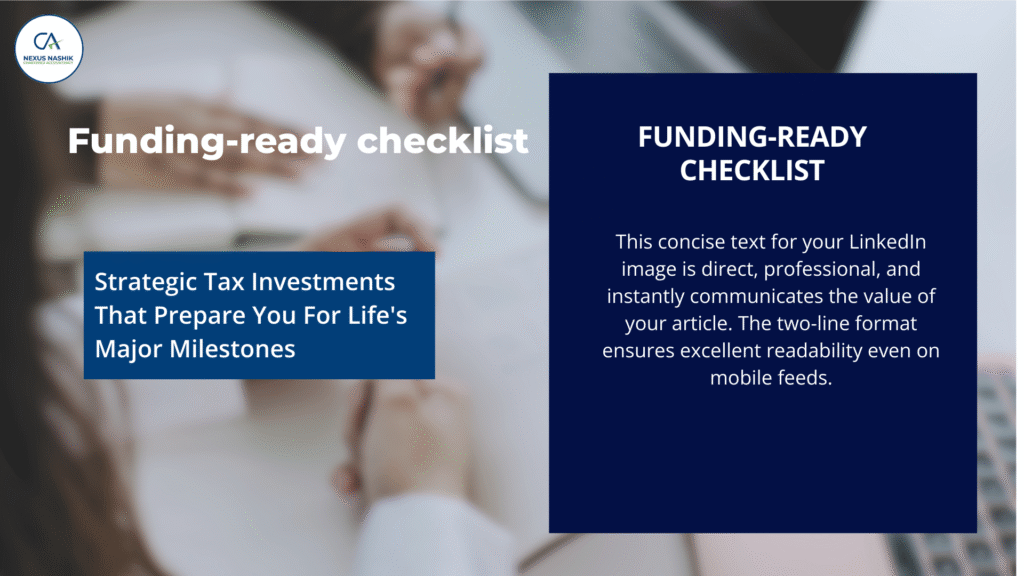Top tax saving investment options for salaried employees are gaining attention as financial planning becomes essential for long-term wealth creation. For professionals, knowing where to invest not only boosts savings but also reduces tax liability. Smart investments under sections like 80C and 80D can significantly impact your financial health. Top Tax Saving Investment Options for Salaried Employees aren’t just beneficial—they’re a smart step toward a financially secure future.
Salaried employees often fall into fixed income brackets with limited options for financial flexibility. Therefore, careful tax planning helps maximize take-home salary and reduce liabilities. The Indian government provides several schemes and provisions under the Income Tax Act to encourage savings and investments while allowing tax deductions. For employees, leveraging these schemes means better savings, future security, and a disciplined approach to wealth creation.
Tax Saving Investment Options for Salaried The essence of tax-saving investments lies in their dual benefits—generating returns and reducing taxable income. As cost of living rises and responsibilities grow, these options become indispensable tools for effective financial planning. From ELSS to PPF, the landscape is filled with powerful avenues designed to reward disciplined savers.
Proven Top Tax-Saving Investment Options for Salaried Employees
Smartest Top Tax-Saving Investment Options for Salaried Employees
Best-Ever Top Tax-Saving Investment Options for Salaried Employees
Powerful Top Tax-Saving Investment Options for Salaried Employees You Should Know

- Game-Changing Top Tax Saving Investment Options for Salaried Employees
- Winning Formula: Top Tax Saving Investment Options for Salaried Employees
- Expert-Recommended Top Tax Saving Investment Options for Salaried Employees
- Ultimate Breakdown of Top Tax Saving Investment Options for Salaried Employees
- Unbeatable Top Tax-Saving Investment Options for Salaried Employees to Maximize Returns
Top Tax Saving Investment Options for Salaried Employees Salaried employees often fall into fixed income brackets with limited options for financial flexibility. Therefore, careful tax planning helps maximize take-home salary and reduce liabilities. The Indian government provides several schemes and provisions under the Income Tax Act to encourage savings and investments while allowing tax deductions. For employees, leveraging these schemes means better savings, future security, and a disciplined approach to wealth creation.
1. Equity-Linked Savings Scheme (ELSS) Tax Saving Investment Options for Salaried
Among the most recommended options, ELSS funds provide excellent opportunities for wealth growth and tax savings. ELSS is a type of mutual fund that qualifies for tax deduction under Section 80C of the Income Tax Act, with a lock-in period of just three years—the shortest among other tax-saving instruments.
It offers the dual benefit of capital appreciation and tax deduction up to ₹1.5 lakh annually. With long-term returns averaging between 10-15%, ELSS funds are ideal for salaried employees willing to take moderate market risks for higher returns. Systematic Investment Plans (SIPs) further simplify investments by allowing monthly contributions that are easy on the pocket and instill investment discipline.
2. Public Provident Fund (PPF)
The Public Provident Fund is one of the oldest and most trusted tax-saving options for Indian salaried professionals. With a lock-in period of 15 years, PPF not only provides tax-free returns but also encourages long-term financial discipline.
You can invest as low as ₹500 and up to ₹1.5 lakh annually, all of which is eligible for deduction under Section 80C. The interest earned is tax-free, and the risk is practically zero, being a government-backed scheme. For conservative investors looking for safety with assured returns, PPF remains a cornerstone investment.
3. National Pension System (NPS)
Tax Saving Investment Options for Salaried The National Pension System is a government-backed retirement savings scheme that helps salaried individuals accumulate a retirement corpus while enjoying tax benefits. Contributions up to ₹1.5 lakh are deductible under Section 80C, with an additional ₹50,000 deductible under Section 80CCD(1B), making it a powerful tool for tax saving.
NPS offers exposure to equity, corporate bonds, and government securities. The option to choose asset allocation makes it customizable to your risk profile. Upon retirement, a portion of the corpus is tax-free, and the rest can be used to buy an annuity for a regular pension.
4. Tax-Saving Fixed Deposits
For risk-averse employees, tax-saving fixed deposits are a straightforward and reliable investment option. Offered by banks with a lock-in period of 5 years, these deposits qualify for deductions under Section 80C.
While the interest earned is taxable, the safety and predictability of returns make them attractive for individuals looking to preserve capital and save tax simultaneously. The interest rates generally range between 5.5% to 7.5%, depending on the bank and tenure.
5. Unit Linked Insurance Plans (ULIPs)
ULIPs combine the benefits of insurance and investment under a single policy. Premiums paid toward ULIPs qualify for tax deductions under Section 80C. In addition, the maturity proceeds are exempt from tax under Section 10(10D), provided certain conditions are met.
ULIPs invest in a mix of equity, debt, or balanced funds, and the policyholder has the flexibility to switch between fund options. While the lock-in period is five years, the potential for higher returns and life cover makes ULIPs a suitable choice for long-term financial planning.
6. Employee Provident Fund (EPF)
For salaried individuals, the Employee Provident Fund is one of the most common and mandatory investment instruments. Contributions made by both employee and employer form a significant corpus for retirement and are eligible for deduction under Section 80C.
Interest earned on EPF is tax-free if the account is held for five years or more. The EPF contribution is automatically deducted from salary, making it a disciplined and hassle-free investment option that serves as both a tax saver and retirement fund.
7. Health Insurance Premiums
Premiums paid for health insurance plans for self, spouse, children, and parents are eligible for deductions under Section 80D. Salaried employees can claim up to ₹25,000 for self and family and an additional ₹25,000 (or ₹50,000 if parents are senior citizens) for parents.
This investment not only offers tax benefits but also provides financial protection against rising medical costs, ensuring peace of mind and safeguarding health.
8. Sukanya Samriddhi Yojana (SSY)
For employees with a girl child, the Sukanya Samriddhi Yojana is a dedicated saving scheme launched by the government, offering a high interest rate and tax benefits under Section 80C. The scheme is available for parents or legal guardians of girls aged below 10.
It’s a long-term plan that matures after 21 years from the date of opening, or upon the girl’s marriage after the age of 18. Interest earned is tax-free, and the safety of government backing makes it highly secure.
9. Home Loan Principal and Interest
Repayment of home loan principal qualifies for deduction under Section 80C, while interest paid on the loan can be claimed under Section 24(b) for up to ₹2 lakh per annum. Additionally, under Section 80EEA, first-time homebuyers can claim an extra deduction of ₹1.5 lakh.
Buying a home is both an emotional and financial milestone. These tax benefits make property ownership more accessible and financially viable for salaried employees.
10. Senior Citizen Savings Scheme (SCSS)
While not directly applicable to younger salaried employees, this is a great option for those planning retirement investments for parents. Contributions to SCSS qualify under Section 80C, and the scheme offers high interest rates with government security.
Gifting this scheme to your retired parents can lead to tax savings and financial benefits for the entire family unit. Interest is paid quarterly, making it a steady source of income for senior citizens.

Strategic Planning for Maximum Benefit
Salaried employees should aim to create a balanced portfolio by distributing investments across various instruments based on their financial goals, risk appetite, and tax liabilities. For instance, combining ELSS with PPF and NPS can ensure a mix of high returns, safety, and retirement benefits.
Additionally, filing your taxes smartly, maintaining necessary documentation, and staying updated with current tax reforms is essential. Consulting a certified financial advisor can add more value and help you select the best tax-saving investment strategies.
Common Mistakes to Avoid
Many salaried professionals rush into tax-saving investments at the last moment, often resulting in hasty decisions. Avoid investing in a single avenue. Diversification is key. Also, ensure that all investments are aligned with long-term goals and do not simply chase short-term deductions.
Failing to understand the lock-in periods, liquidity, or tax implications on maturity can undermine the entire purpose of investment. Awareness and planning are the cornerstones of smart financial decisions.
How to Choose the Right Tax-Saving Investment?
Choosing the right option involves evaluating:
- Risk tolerance: How much fluctuation in returns can you manage?
- Time horizon: Are you saving for short-term needs or retirement?
- Tax impact: Will the returns be taxed at maturity or are they tax-exempt?
- Liquidity: Do you need quick access to funds or are you okay with lock-ins?
The right mix will not only reduce your tax liability but also help build wealth efficiently over the years.
Conclusion: Secure Your Future With Smart Tax-Saving Investments
Top tax-saving investment options for salaried employees are the foundation of strategic wealth building. By carefully allocating funds into diversified tax-saving instruments, salaried professionals can reduce tax burden and simultaneously create a corpus for future goals like buying a house, funding children’s education, or planning retirement. Whether you’re a risk-taker or someone who prefers assured returns, there is a tax-saving investment that aligns with your financial goals.
Take the next step in optimizing your income—start building your tax-saving investment portfolio today. Visit our website to explore customized solutions, expert guidance, and powerful financial tools that are designed to support the goals of every salaried employee.
Maximize your savings, minimize your taxes—start your journey to financial freedom now. Click here to take charge of your financial future today!